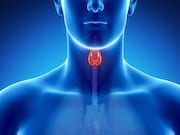Greater organ-absorbed doses may be modestly positively associated with risk of solid cancer death
TUESDAY, July 2, 2019 (HealthDay News) — For patients with hyperthyroidism treated with radioactive iodine (RAI), greater organ-absorbed doses seem to be positively associated with increased risk of death from solid cancer, according to a study published online July 1 in JAMA Internal Medicine.
Cari M. Kitahara, Ph.D., from the U.S. National Institutes of Health in Bethesda, Maryland, and colleagues performed a 24-year extension of the multicenter Cooperative Thyrotoxicosis Therapy Follow-up Study, which has followed U.S. and U.K. patients diagnosed and treated for hyperthyroidism beginning in 1946. A total of 18,805 patients who were treated with RAI and had no history of cancer at the time of first treatment were included in the analysis.
The researchers identified statistically significant positive associations for all solid cancer mortality (relative risk [RR] at 100-mGy dose to the stomach, 1.06), including female breast cancer (RR at 100-mGy dose to the breast, 1.12), and all other solid cancers combined (RR at 100-mGy dose to the stomach, 1.05). In patients with Graves disease, the 100-mGy dose to the stomach and breast corresponded to a mean administered activity of 243 and 266 megabecquerel, respectively. An estimated lifetime excess of 19 to 32 solid cancer deaths could occur for every 1,000 patients with hyperthyroidism receiving typical doses to the stomach (150 to 250 mGy).
“Additional studies are needed to fully weigh the risks and advantages of RAI and other major treatment options available to patients with hyperthyroidism,” the authors write.
One author was a member of the Data Monitoring Committee of the Medullary Thyroid Cancer Consortium Registry, which is supported by pharmaceutical companies.
Copyright © 2019 HealthDay. All rights reserved.








